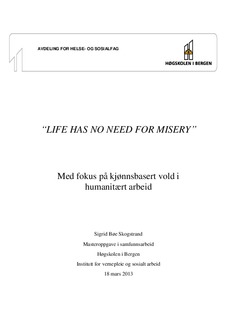“LIFE HAS NO NEED FOR MISERY” Med fokus på kjønnsbasert vold i humanitært arbeid
Master thesis
Permanent lenke
http://hdl.handle.net/11250/2481879Utgivelsesdato
2013-03-18Metadata
Vis full innførselSamlinger
Sammendrag
Bakgrunn /hensikt med oppgaven: Hensikten med studien er å oppnå økt innsikt i, og forståelse av hvordan kjønnsbasert vold blir håndtert i humanitært arbeid. Kjønnsbasert vold må sees i lys av både historiske, kulturelle og politiske kontekster. Studien kan være et bidrag til at fokus på og diskusjoner om kjønnsbasert vold tar innover seg den fulle kompleksiteten av fenomenet. Teoretisk forankring: Utgangspunktet for studien er samfunnsarbeid som er å identifisere handlingsrom og undersøke vilkår for sosial deltakelse sammen med dem det gjelder. Kjernebegreper er empowerment, samhandling, deltakelse, dialog og kritisk bevissthet. Metode: Det empiriske grunnlaget for studien er basert på flerstegsfokusgruppe med fire deltakere, tre kvinner og en mann, intervjuet i to omganger. Kunnskapsbidrag / funn: Materialet viser at humanitære organisasjoners handlingsplaner og strategier for håndtering av kjønnsbasert vold i felt avhenger både av samarbeid mellom organisasjonene og hvordan organisasjonene formidler sine handlingsplaner og strategier til operasjonelt personell i felt. Tydelighet, og klargjøring av grunnprinsippene, er vesentlig i denne sammenheng blant annet for å redusere usikkerhet i felt for å håndtere kjønnsbasert vold. Videre forskning: Materialet viser at det er en sammenheng mellom organisasjoners formidling av handlingsplaner og strategier for håndtering av kjønnsbasert vold til delegater og praksis i felt. Videre forskning bør utforske hvilken betydning kjønnsperspektiv har innen humanitære organisasjoners egne administrative og organisatoriske rammer for å finne ut om det er en utslagsgivende sammenheng mellom denne betydningen og praksis i felt når det gjelder håndtering av kjønnsbasert vold. Nøkkelord: kjønnsbasert vold, sosial orden, samhandling, deltakelse, kritisk bevissthet. Thesis background and purpose: The purpose of this study is to enhance the insight into and understanding of how gender-based violence is handled in humanitarian work. In order to shed light on gender-based violence, historical, cultural and political contexts need to be taken into account. The present study aims to stimulate current approaches and debates to acknowledge the full complexity of the issue. Theoretical framework: Community work is the basis of this study. Community work means to examine the conditions of social interaction through participation with the groups concerned, and to identify fields of action. Key terms are empowerment, interaction, participation, dialogue and critical consciousness. Method: Multistage focus group interviews constitute the empirical foundation of the study, including four participants; three women and one man, interviewed in two sessions. Contribution to knowledge/ Results: The material demonstrates that humanitarian organizations’ action plans and in-field strategies for handling gender-based violence, depend on both the cooperation between the organizations and on how the organizations communicate their action plans and strategies to the operational field personnel. Accordingly, clarity and explanation of ground principles are essential, among other things to reduce uncertainties about handling gender-based violence in the field. Future research: The material demonstrates a clear relation between how the organizations communicate their action plans and field strategies for handling gender-based violence to delegates, and their in-field performance. Future research should investigate the meaning and importance of gender perspectives within humanitarian organizations’ administrative and organizational frames, to find out if/ to what extent there is correlation between this meaning and importance on the one hand, and the field performance of handling gender-based violence on the other. Keywords: Gender-based violence, social order, interaction, participation, critical consciousness.
Beskrivelse
Masteroppgave i samfunnsarbeid

